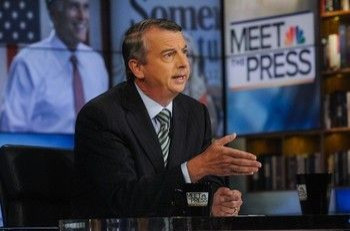Romney Camp Refuses To Name Bundlers But Accuses Obama Of Favoring Top Donors

The question of Mitt Romney's financial transparency may have been unintentionally magnified by the campaign itself on Monday, after strategist Ed Gillepsie accused the White House of crafting government policy to favor its top donors.
Following a week of attacks on Romney's tenure at Bain Capital, topped off by a series of advertisements by both the Obama campaign and the Democratic super PAC Priorities USA that paint the Republican presidential nominee as the mega-wealthy beneficiary of a tax code that favors the wealthy, Gillespie attempted to regain the offense against the Obama campaign during a conference call with reporters on Monday morning.
In a move to call questions to President Barack Obama's own transparency, Talking Points Memo and Slate report Gillespie said the White House has used government policy to favor bundlers -- that is, high-profile fundraisers who collect contributions from friends and associates and deliver the money to political candidates in one big bundle.
If you're a middle-class worker, you're facing the prospect of layoffs; if you're an Obama contributor, you're ... benefiting from payoffs, Gillespie told reporters, according to Talking Points Memo.
Gillespie's argument is problematic, because it only served to highlight the fact that Romney has refused to disclose the name of his own bundlers. If Obama's high-dollar donors stood to gain from a government policy, that information could easily be revealed to the American public, because the Obama campaign has steadily revealed and updated the name of its bundlers, who are identified as volunteer fundraisers.
An NBC reporter followed up by asking if the Romney campaign would reveal its own bundlers, so voters could theoretically judge the Romney administration on the same count. But Gillespie completely skipped over bundler questions by saying the names of Romney's individual contributors are already public.
The names of individuals who donate more than $200 are required by law to be disclosed in Federal Election Committee reports. But federal law only requires campaigns to name bundlers who are also registered lobbyists.
As of now, 25 lobbyists have raised more than $3 million on behalf of Romney, according to the Center for Responsive Politics. Beyond that information, the Romney campaign has opted to shield the identities of its wealthy donors.
In March, a coalition of government watchdog groups, including the Center for Responsive Politics, sent a letter to the Romney campaign asking it to disclose the names of its major fundraisers, noting that revealing those names is a precedent already set by President George W. Bush (in 2000 and 2004), Sen. John Kerry (in 2004), Sen. John McCain (in 2008) and Obama (in 2008 and during the 2012 election cycle).
All of this occurs as the Senate prepares to vote on the new version of the campaign finance Disclose Act. Because every Republican senator has refused to support the legislation, which would force outside political spending groups to reveal the name of its donors, the bill is expected to be killed with a cloture vote.
© Copyright IBTimes 2024. All rights reserved.





















